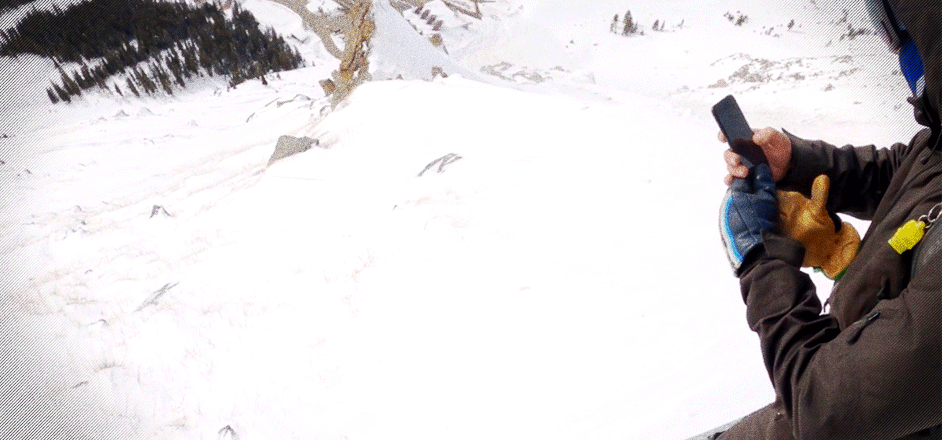It was March, the resorts had closed and backcountry skiing and boarding was the only skiing and boarding left to do. Tyler DeWitt and Evan Hannibal were experienced in the backcountry and knew the risks associated with boarding out there. They’d set out early in the day to earn some turns on Loveland pass’ west facing slope, over I-70’s Eisenhower tunnel.
The two friends hadn’t made it far on the descent, however, when they heard a crack and an avalanche started sliding down the chute directly below them. Horrified, both boarders watched, helpless, as the charging wall of snow grew and grew, careening towards 1-70 and the tunnel structure.
“Fuck, dude that is what I was worried about,” said Hannibal.
“Dude we just buried the road,” DeWitt says, watching the side, quickly realizing the heavy implications. “Fuck, dude that is not good,”
“I really hope nobody was on that road,” Hannibal says.
Lucky for both of them, no one was down there. However, the slide they triggered not only buried the tunnel’s service road in over 20 feet of packed snow, but destroyed an avalanche mitigation device just above the tunnel. In the video, you can see the wall washing over the road and slamming into the building like an ocean wave against a breaker.
The two boarders paused to discuss their plan of action and made a safe descent. Once at the bottom, they immediately called 911 to report the slide themselves: they spoke with police, and Hannibal even turned over his helmet video of the incident to the Colorado Avalanche Information Center for them to “collect data” on the slide.
It was the responsible thing to do, after all. Sure, they could have taken off and potentially disappeared without ever being traced back to the slide. But they turned themselves in instead, and even gave CAIC evidence that would soon be used against them.
Today DeWitt and Hannibal are being charged with criminal reckless endangerment and could face up to $168,000 in damage costs. It’s something that has never happened in Colorado’s history before, and which could set a dangerous precedent for backcountry conduct in this state.
“We charged them with reckless endangerment because it was foreseeable they were putting other people at risk of serious bodily injury in that they recognized the potential for a slide and they could obviously see, right below their skis, I-70, where 100,000 cars go by each week,” said Bruce Brown, the district attorney for Colorado’s 5th Judicial District. “They knew if there was a slide, it could end up on the roadway, endangering the traveling public.”
On top of that, the slide destroyed a remote controlled O’Bellex mitigation cannon installed over Eisenhower Tunnel in 2018. Those cannons are expensive and the state wants DeWitt and Hannibal to pay for the replacement of the avalanche mitigation equipment (which the boarders assert, clearly wasn’t doing its job).
“The riders assumed that the avalanche mitigation to protect the tunnel infrastructure decreased the avalanche hazard on the slope,” reads CAIC’s report on this slide. “Backcountry travelers who are unaware of the differences often overestimate the hazard reduction from an infrastructure mitigation program.”
Dewitt disagrees.
“Those cannons are in place to control snow through the year and decrease the large build-up of deep, persistent slab avalanches. And that’s exactly what we exposed,” he said. “The CAIC and CDOT cannons were not doing what they claimed to be doing.”
CDOT says they’re looking into “alternative plans to ensure the slide path is safe” until the cannon is replaced.
While CAIC says the boarders should have understood the risk, DeWitt and Hannibal maintain that they were being neither careless nor reckless. They had checked the CAIC forecast that morning, they had all of the necessary safety equipment and were noting hazards as they descended, one at a time, pausing in “safe zones” as they went. Between the two of them they have over 30 years of experience backcountry snowboarding — and Hannibal even works as an emergency medical technician in Vail.
They weren’t unprepared and they weren’t being reckless, they argue. And, anyway, they’re the ones who reported the avalanche in the first place.
“We called the authorities in on ourselves.” Hannibal told the Colorado Sun in an interview. “We handled it in a professional manner and tried to be as professional as we could be when a mistake was made.”
And yet still they’re being prosecuted and charged as criminals.
According to Hannibal, that’s a dangerous precedent to set for people who are trying to do the right thing. Punishing someone for taking responsibility for their actions in the backcountry won’t make it any safer out there.
“I think the backcountry community should be worried about the repercussions here, when you report an avalanche and tell the truth and get charged with a crime,” said Hannibal.
This is a novel situation, legally speaking. Never in Colorado history has a backcountry avalanche incident been criminally prosecuted. And it’s raising some very complicated questions: How do you encourage people to report accidents responsibly, if they’re liable to be criminally charged? What exactly constitutes “reckless endangerment” out of bounds? And who will enforce that definition?
The trial for DeWitt and Hannibal will likely answer a lot of these questions (and could raise a lot more). It’s scheduled to be held later this October, just before ski season starts. And, with CAIC and backcountry search and rescue teams expecting this year to be one of the busiest backcountry years in history, it could add yet another threat to backcountry skiing and boarding: criminal reckless endangerment charges.


Leave a Reply
You must be logged in to post a comment.